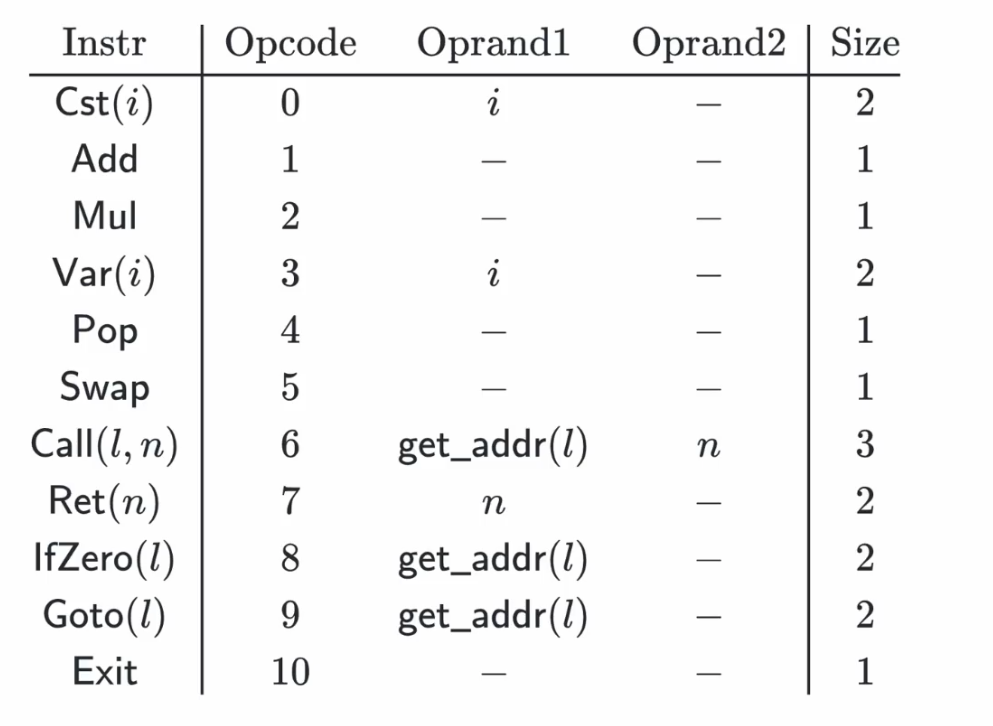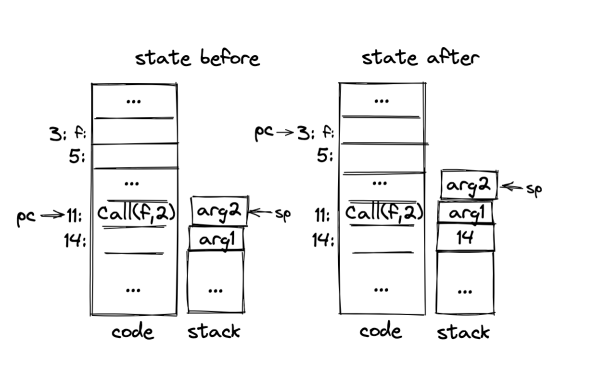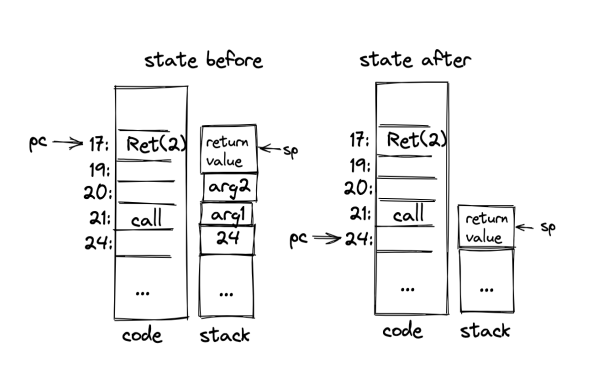作者
Ivan Chien
始于
分类:PL
Tags: [ PL ]
程序语言理论和实现 Week 4 - 新指令集、编解码和虚拟机
始于
分类:PL
Tags: [ PL ]
程序语言理论和实现 Week 4 - 新指令集、编解码和虚拟机
Stack Machine and Compilation - Part 1
New Instructions: Call and Ret
type instr = ... | Call(label, int) | Ret(int)
New Instructions: Conditions
type instr = ... | Goto(label) | IfZero(label)
比如,[[ if a then b else c ]] 会被编译到:
[[a]]
IfZero(if_not)
[[b]]
Goto(end_if)
Label(if_not)
[[c]]
Label(end_if)
Instructions
type instr =
| Cst(int) | Add | Mul | Var(int) | Swap | Pop | Label(string)
| Call(string, int) | Ret(int) | Goto(label) | IfZero(label) // control flow instructions
| Exit
Encoding Spec

HW
Implement the virtual machine in C/C++/Rust.
实现一台能够运行这个新指令集的虚拟机,这个虚拟机是能够做到语言无关的。我这里使用了 Rust 实现,具体代码在:https://github.com/Yescafe/language_learning/tree/6515635262c1485a498068d202b472a96eb5a457/Rust/pltai/lec4/src。
下面说两个重要的部分:
Some(Opcode::Call) => {
let callee_addr = self.code[self.pc + 1];
let arity = self.code[self.pc + 2];
let mut args = vec![];
// 将 arity 个参数出栈保留下来
for _ in 0..arity {
args.push(self.rts.pop().unwrap());
}
// 返回地址入栈
self.rts.push(i32::try_from(self.pc + 3).unwrap());
// 将刚出栈的参数再放回去。这样就做到了把返回地址插到 arity 个参数之前
for arg in args {
self.rts.push(arg);
}
self.pc += usize::try_from(callee_addr).unwrap();
},
对应下图:

Some(Opcode::Ret) => {
let arity = self.code[self.pc + 1];
// 返回值出栈,保留
let return_value = self.rts.pop().unwrap();
// 所有实参出栈
for _ in 0..arity { self.rts.pop(); }
// 返回地址出栈
let return_addr = self.rts.pop().unwrap();
// 返回值重新入栈。在 x86 机器上返回值一般是存在 EAX 寄存器里的,这种经常需要用到的东西,
// 如果放在栈上会产生没有必要的 memory traffic
self.rts.push(return_value);
self.pc = usize::try_from(return_addr).unwrap();
},
对应下图:

其它的不太重要的部分见完整代码仓库。
我的栈可能建反了,到 Part2 的时候再看要不要改。
补充:为什么 if then else 不能用函数表示
工业界的语言大多有 side effect(所以一些纯函数式肯定就排除在外了),而且它们在归约代码的时候大多使用 call-by-value 的序(所以这里 Haskell 也不满足了:Haskell 不仅是纯函数式,而且是 call-by-name 的),于是就不能用这样的函数 if_then_else(cond, a, b) 去表示 if then else 结构,因为这样 cond、a、b 都需要被分别求值,如果有 side effect 那必然会出现问题。所以需要专门为 if then else 提供一个原语。我记得 SICP 有个习题说的就是这个。